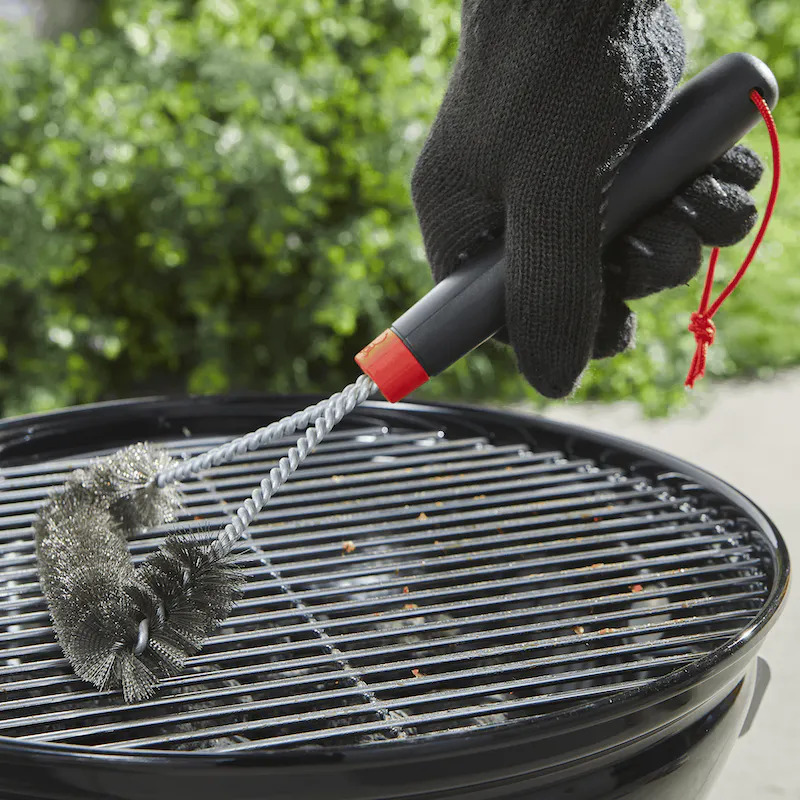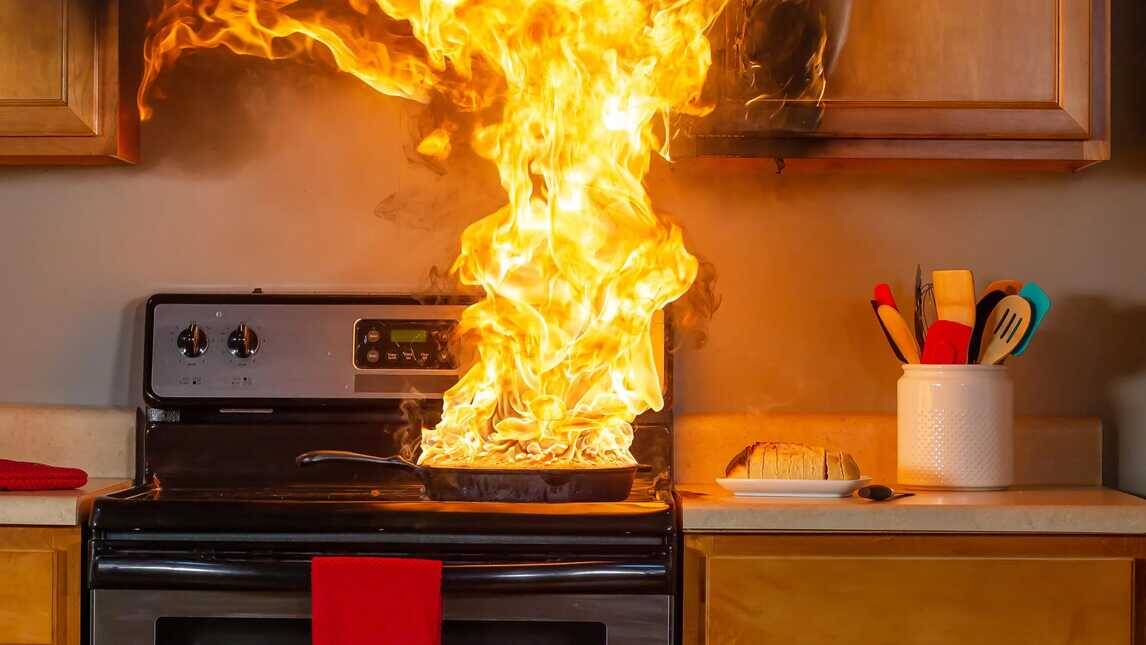Australian Mom Issues Urgent Warning As Her Girl Nearly Dies From Bacon And Egg
Discover the shocking story where a girl nearly dies from bacon and egg. Learn about the unexpected hazard that threatened their life and the crucial lessons it imparts on safety and vigilance.
Author:Morgan MaverickReviewer:Professor JhizOct 20, 2023266 Shares53.2K Views

A seemingly innocent beloved snack in Australia—recently turned into a terrifying ordeal for a young girl in Newcastle, New South Wales as a girl nearly dies from bacon and egg. The incident was so serious that her mother felt compelled to issue an urgent warning to other parents.
The young girl's mother took to social media to share the harrowing experience after her daughter's innocent bites of a bacon and egg roll landed her in the hospital. What began as a simple snack soon took a dark turn, leading to a life-threatening situation that no one could have anticipated.
Girl Nearly Dies From Bacon And Egg
Kristen Saunders, the mother, explained that her daughter, while enjoying a bacon and egg roll from a local sausage sizzle, suddenly started to feel like she was choking. Like most parents, she initially thought it would pass and offered her some water, hoping it would settle down. However, as time passed, the situation took a more alarming turn.
When she took her daughter to the doctors, they couldn't identify the problem, but the nine-year-old continued to suffer from a sore throat and struggled to consume solid foods. Things took a dramatic and frightening turn when the young girl's behavior became erratic and confused.
The mother recalled, "There was this one particular day I was at home with her, and all of a sudden, she was a bit confused answering questions. I was like, 'Hang on, there's something really problematic here,' and called the GP—she [the GP] said, 'Go straight to the hospital.'"
Upon arriving at the hospital, it became evident that something was seriously wrong. The young girl was stumbling, disoriented, and couldn't even recognize her own family. It was a nightmarish situation, and it was soon revealed that a piece of wire from a barbecue brush, used to clean barbecues, had caused the life-threatening condition.
The wire had pierced the girl's esophagus and then pushed into the carotid artery of her neck. This perilous situation required major vascular and cardiothoracic surgery, followed by aspiration of brain abscesses. The young girl faced an excruciating six weeks on intravenous antibiotics as part of her treatment.
During her hospital stay, a CT scan identified a "tiny bit of wire, sore of near her neck." The mother explained, "There was a major infection in one of her arteries. They had to replace it, and there was a risk of all these different things, so that was pretty awful."
Thankfully, the young girl is now back in school and off antibiotics, on the path to recovery. However, her mother wants to ensure that other families do not face a similar traumatic experience.
She implores parents to take action, saying, "Please please please protect your family and friends and THROW OUT your wire BBQ grill brushes."
Preventing Barbecue Brush Wire Mishaps
Barbecue brushes are a common tool for grill enthusiasts, but as the incident involving the young girl in Newcastle, New South Wales, has shown, they can pose unexpected risks.
With the summer season in full swing, grilling enthusiasts are firing up their barbecue grills for outdoor cookouts and gatherings. Before you indulge in your next BBQ meal, it's vital to pay attention to your grill brush. While stainless steel or brass wire brushes are commonly used to clean grill grates, a hidden danger lurks: small, sharp bristles can break off during cleaning and become embedded in your grill's cooking surface. These stray bristles pose a significant risk as they can adhere to your food and be accidentally ingested.
According to a study published in the journal Otolaryngology-Head and Neck Surgery in 2016, approximately 1,700 Americans sought emergency room treatment between 2002 and 2014 after ingesting wire bristles from grilled food.
Shockingly, one in four individuals with grill brush injuries required hospitalization. However, it's essential to recognize that these numbers may not capture the full extent of such accidents since the study relies solely on ER visits and does not account for cases in urgent care facilities or other outpatient settings.
The most commonly reported injuries from grill brushes affect the mouth and throat, but there have been rare instances where individuals sustained stomach and intestinal injuries after swallowing a concealed bristle.
Despite these potential hazards, there's no need to abandon grill cleaning altogether. There are alternative cleaning tools and safe practices you can adopt to keep your grill grates free of food remnants without worrying about stray bristles.
6 Tips To Clean Your Grill Safely
To protect your loved ones from similar accidents and ensure safe grilling practices, here are some essential safety measures to consider:
1. Inspection and Replacement- Regularly inspect your barbecue brush for signs of wear and tear. Check for loose bristles, damaged wires, or any other issues that could lead to wire breakage. If you notice any problems, it's time to replace the brush.
2. Choose Safe Alternatives- Consider using alternative grill-cleaning tools that don't involve wire bristles. There are grill brushes available with nylon or wooden bristles that reduce the risk of wire ingestion.
3. Proper Cleaning Techniques- When cleaning your grill, avoid excessive force when scrubbing. Gentle and consistent pressure can effectively remove residue without the risk of bristle breakage.
4. Grill Inspection- Before cooking, inspect your grill grates carefully. Look for any loose wires or debris left behind by the brush. If you see any stray wires, remove them immediately.
5. Safe Grill Practices- While grilling, be vigilant about your cooking area. Ensure that no loose wires from the brush have fallen onto the grill grates or food. Also, consider cleaning your grill in advance and inspecting it again after cooking to ensure safety.
6. Education and Awareness- Share the story of the Newcastle incident with friends and family. Increasing awareness about the potential dangers associated with barbecue brushes can help prevent similar accidents.
By taking these precautions and being mindful of the safety of your family and guests, you can enjoy delicious barbecue without the worry of hidden hazards. It's a small effort that can make a significant difference in preventing wire mishaps and ensuring the well-being of those you care about.
Common Kitchen And Food-Related Hazards
A home is not complete if it does not have a kitchen. However, the kitchen can potentially pose some dangers to anyone accessing it. Although there are common kitchen hazards we face, it is possible to avoid them.
Common risks in the kitchen are; fire, electrical issues, burns, slipping, improper handling of kitchen equipment, food poisoning, and improper storage.
The Newcastle incident involving the ingestion of a wire from a barbecue brush serves as a stark reminder that everyday activities, even seemingly harmless ones like enjoying a bacon and egg roll, can carry unexpected risks.
To help you stay informed and keep your family safe, here are some common kitchen and food-related hazards to be aware of:
Fire
The leading cause of residential fires is cooking, mainly due to unattended cooking. Fires can also result from electrical appliances in the kitchen and oils. To avoid fire, you should exercise the following precautions:
- Monitor your food when cooking at high temperatures.
- Set a timer if you are simmering to remind you that you have food in the kitchen.
- When cooking with oil at high temperatures, cover the cooking pot with a lid.
- Remove any spills, clothes, or any paper that may ignite from anywhere close to your stove.
- Cook with tight-fitting clothes, as loose clothes may ignite.
Fire can cause a lot of damage to your home, hence the need to carry out the above preventive measures. However, if a fire occurs, you should evacuate from the premises immediately and contact the local fire agency.
Electrical Issues
We are transforming our kitchens each day to make work easier. Most of the devices in the kitchen are electrical devices leading to another hazard in the kitchen. Electrical fires and electrical shocks may occur in the kitchen as a result. When dealing with electricity:
- Take regular inspections to ensure the cable wires are in order.
- Naked wires must be repaired by professionals as soon as they are detected.
- When plugging in sockets, ensure that your hands are dry.
Burns
Contact with hot food, liquids, and equipment can cause burns. Burns commonly affect children, so if you have children playing around the kitchen, make sure you supervise them. Due to slips in the kitchen, some burns occur in scenarios whereby the person is trying to steady himself/herself with a hot container.
To avoid burns, you should:
- Have slip-resistant footwear to avoid slips.
- Avoid carrying containers with hot liquids.
- Maintain your equipment, especially the pressurized cook equipment.
Bonus tip!
When heating with a microwave, use vented containers. If you use a covered container, puncture the lid to allow the steam to escape, as the steam from microwaves can go up to 200 degrees.
Slipping And Falling
Slipping and falling can occur in the kitchen due to slippery floors, uneven floors, and a fall when trying to reach something from the shelf. Slipping and falling can cause injury, burns, and broken arms.
- Remove any spills that may cause slipping.
- Utilize water damage restoration services when water is leaking.
- Avoid carrying heavy items on a ladder.
- Use steady stools when getting things from a higher shelf.
Improper Handling Of Kitchen Equipment
Kitchen equipment can be a hazard if not handled with care. Knives are for cutting in the kitchen, and you should use them with utmost care. When handling knives:
- Ensure that they are kept sharp at all times.
- Keep the handles in good order, and remove any grease that may be on them.
- When washing the knives, keep the sharp side away from you.
Food Poisoning
The CDC estimates that in a year, 48 million get sick from foodborne diseases. Therefore, carrying food safety measures is a necessity in every home to promote your family's protection. The measures are:
- Cleaning of hands, fruits, and vegetables.
- Washing utensils using warm, soapy water.
- Ensure that you cook food properly.
Raw food is one of the causes of food poisoning. To make sure your food is well-cooked, utilize a food thermometer to ensure that the temperature is high enough to kill germs when cooking.
Improper Storage Of Equipment
All items in a kitchen should be kept in an orderly manner. Disorganization can cause injury where you have massive objects falling on you and tripping on things. It can also lead to an unhygienic kitchen, causing food poisoning. Use the following tips to store your items better:
- Never store heavy items above your waist level.
- You should store all allergic items in a unique place.
- The fridge's temperature should be 0-5 degrees.
While the kitchen is a dangerous part of your home, it is possible to turn it into a safe environment. Some of the kitchen hazards can cause life-threatening injuries, so you should not ignore any of the above-mentioned measures.
Workplace Hazards In Commercial Kitchens
The hazards aren't limited to home kitchens; commercial kitchens also have their share of risks. In a bustling foodservice environment, safety is paramount. Here are some common kitchen hazards and how to avoid them:
Knife Injuries
According to Safework, knife injuries account for 3% of all injuries in the workplace, with hands and fingers being the most commonly affected areas. To avoid knife injuries:
- Keep knives well-maintained and sharp.
- Always use the correct knife for the job.
- Cut away from your body when trimming or deboning.
- Use last slice devices to prevent injury.
Burn Hazards
Burn hazards are prevalent in commercial kitchens due to hot surfaces, direct flames, and hot oils. To minimize burn risks:
- Use protective clothing like heat-resistant gloves and aprons.
- Be cautious when handling hot pots, pans, and trays.
- Protect against scalding from hot liquids by using appropriate containers and avoiding overcrowding.
Injury From Machines
Working with machines in the kitchen carries risks, and proper training is essential. To reduce the risk of machine-related injuries:
- Ensure all staff are adequately trained.
- Do not operate machinery when tired, ill, or under the influence.
- Maintain proper spacing when using machinery to avoid collisions.
- Follow safety guidelines and use safety guards as per the machine's manual.
Slips, Trips, And Falls
These accidents are common in commercial kitchens, with 16% of workplace injuries attributed to them. To prevent slips, trips, and falls:
- Report potential hazards immediately.
- Clean spills promptly.
- Keep walkways clear.
- Use non-slip floor coverings in spill-prone areas.
- Wear appropriate non-slip footwear.
Head & Eye Injuries
Head injuries account for 11% of all workplace injuries, and eye injuries make up 6% of head injuries in various industries. To reduce the risk of these injuries in the kitchen:
- Mount shelves at safe heights.
- Be cautious when accessing confined spaces.
- Use protective gear like goggles or full-face guards when handling hot oils or chemicals.
- Be mindful when moving objects to avoid injury to yourself and others.
Crowded Workspace Risks
Overcrowding in the kitchen can lead to accidents and spills. To minimize risks:
- Keep walkways clear.
- Ensure sufficient workspace for kitchen staff.
- Limit non-essential staff access to the kitchen.
Lifting Injuries
Lifting, pushing, pulling, and bending tasks can result in musculoskeletal injuries, making up 24% of workplace injuries. To prevent these injuries:
- Maintain proper posture and technique when lifting.
- Use step ladders to avoid overreaching.
- Utilize equipment to reduce overexertion risks.
Fire Hazards
Commercial kitchens house flammable materials, making them prone to fires. To reduce fire hazards:
- Inspect equipment for wear and tear.
- Follow recommended cleaning and maintenance schedules.
- Ensure equipment is turned off when not in use.
Electric Shock
Electric shocks are a genuine hazard in kitchens with numerous appliances. To prevent electric shock:
- Keep power leads off the floor.
- Avoid using faulty equipment or cords.
- Do not plug in equipment with wet hands.
- Report faulty equipment immediately.
By being aware of these hazards and following safety measures, you can significantly reduce the risk of workplace accidents in commercial kitchens. Workplace safety is essential for both employees and customers in the foodservice industry, and it's crucial to adhere to compliance guidelines to ensure a safe working environment.
Whether in your home kitchen or a commercial one, awareness and adherence to safety practices are crucial for avoiding accidents and injuries. By addressing these common hazards and following safety guidelines, you can create a safer cooking environment for yourself and others. Remember that safety should always be a priority in the kitchen.
Girl Nearly Dies From Bacon And Egg - FAQs
What Happened In The Incident Involving The Teenager And Bacon And Eggs?
In this incident, a teenager faced a life-threatening situation after consuming bacon and eggs due to an unexpected hazard. The hazard was not related to allergies but involved the ingestion of a foreign object.
What Was The Foreign Object That Caused The Life-threatening Situation In This Story?
The foreign object that posed a significant danger to the teenager was a piece of wire from a barbecue brush, which was accidentally ingested while eating the bacon and eggs.
How Did The Teenager Receive Treatment And Survive This Life-threatening Situation?
The teenager received immediate medical attention, including major surgery and a prolonged period of medical care. The wire had pierced the esophagus and pushed into a major artery in the neck. After the surgical procedures and several weeks of intravenous antibiotics, the teenager recovered and returned to normal life.
Conclusion
In conclusion, the incident where a girl nearly dies from bacon and egg is a stark reminder that dangers can unexpectedly lurk in everyday scenarios. While we typically associate simple and familiar foods with safety, this story sheds light on the crucial importance of remaining vigilant and cautious in our daily lives.
Surprisingly, it wasn't food allergies but rather a piece of wire from a barbecue brush that nearly proved fatal in this case. The teenager's rapid transition from enjoying a seemingly harmless meal to undergoing life-saving surgery underscores the need for heightened awareness and preparedness.
This incident serves as a poignant testament to the critical role of immediate medical attention in preserving lives. It also reinforces the importance of being mindful of the tools and objects we use during food preparation, emphasizing the need for safety precautions at all times.

Morgan Maverick
Author
Morgan Maverick is an unorthodox news reporter driven by an insatiable hunger for the truth. Fearless and unconventional, he uncovers hidden narratives that lie beneath the surface, transforming each news piece into a masterpiece of gritty authenticity. With a dedication that goes beyond the boundaries of conventional journalism, Morgan fearlessly explores the fringes of society, giving voice to the marginalized and shedding light on the darkest corners.
His raw and unfiltered reporting style challenges established norms, capturing the essence of humanity in its rawest form. Morgan Maverick stands as a beacon of truth, fearlessly pushing boundaries and inspiring others to question, dig deeper, and recognize the transformative power of journalism.

Professor Jhiz
Reviewer
Professor Jhiz brings fun to teaching anatomy. Born in China, she shares her fascination for how the body works.
Students say her lectures are lively with jokes and stories. She draws cartoon diagrams that highlight structures creatively.
Professor seeks to inspire curiosity and joy in anatomy. She treats each class like a show using props and costumes.
When not teaching, Jhiz enjoys karaoke and novelty socks. Her goal is passing on a spirit of wonder to students.
Latest Articles
Popular Articles


